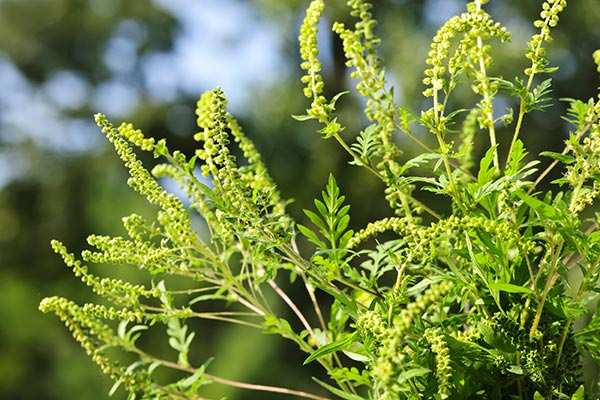Ragweed is bad for those with hay allergies, but it's great for protecting nerves against Alzheimer's

(Natural News) The common ragweed (Ambrosia artemisiifolia) is, all at once, a backyard weed, an allergen – and a potential treatment for Alzheimer’s disease. In a recent paper, researchers from Seoul National University (SNU) have identified compounds in ragweed that can protect brain cells from peptides present in Alzheimer’s.
Weed, medicinal plant and potential treatment
In the northern hemisphere, spring heralds the arrival of allergy season. One of the worst culprits is the common ragweed, a plant native to North America but now found around the world. While its pollen is a known trigger for allergies, touching the plant itself is enough to trigger allergic reactions.
Ragweed also affects the taste of edible food. Cows that eat it will produce bitter-tasting milk, while wheat that gets contaminated by it will likewise turn bitter. But, the plant has its uses and proponents – both Native Americans and Western herbalists consider it a medicinal plant.
The Cherokee use it as an herbal medicine for fever, hives, insect stings, pneumonia, and toe infections. The Dakota alleviate diarrhea and vomiting with it. Finally, the Iroquois give it to cramps and stroke victims.
In Western herbal medicine, the common ragweed is used to stop bleeding and as an antiseptic. It’s also recognized for its stimulant and astringent properties. (Related: Major component of silymarin may help prevent Parkinson’s and Alzheimer’s.)
Natural chemicals in ragweed keep Alzheimer’s disease at bay
For the current study, which was published in the Journal of Natural Products, SNU researchers studied new compounds in the common ragweed that might protect brain cells from Alzheimer’s disease.
 | Discover how to prevent and reverse heart disease (and other cardio related events) with this free ebook: Written by popular Natural News writer Vicki Batt, this book includes everything you need to know about preventing heart disease, reversing hypertension, and nurturing your cardiac health without medication. Learn More. |
Alzheimer’s disease is a neurodegenerative condition that often affects older people, causing a steady decline in their memory, thinking and reasoning skills. Studies have linked the illness with amyloid-B peptides, which accumulate into toxic plaques that damage and kill nerve cells. Several drugs have been cleared for treating Alzheimer’s patients. However, they only slow down the progress of the disease for a short time. They also have various adverse effects as well.
In a preliminary study, SNU researcher Won Keun Oh and his teammates screened natural plant extracts for potential activity against Alzheimer’s disease. Surprisingly, they found the common ragweed to be a candidate.
The team isolated 14 substances from the aerial parts of the plant. The compounds displayed the ability to reduce the toxic effects of amyloid-B peptides on neurons. Earlier studies identified seven of the 14 compounds, including terpenoids and spermidine conjugates. The remaining chemicals were newly discovered terpenoids.
The SNU researchers examined the chemical structures with various analytical techniques. Afterward, they tested both old and new compounds by treating cultured neurons that produced amyloid-beta peptides. Ten out of the 14 compounds displayed protective effects against the toxic effects of amyloid-B. The compounds with the highest activity achieved moderate levels of neuroprotection that depended on the dosage applied. The researchers reported that 20 percent more brain cells survived exposure to amyloid-B proteins after getting treated with the two most active terpenoids from common ragweed.
The findings of the study indicate that the common ragweed may serve as a source of natural chemicals for treating patients with Alzheimer’s disease.
Sources include:

